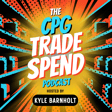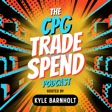
Interview with Kyle Barnholt the Podcast Host and Founder of TrewUp
In this debut episode of The CPG Trade Spend Podcast, host Kyle Barnholt is joined by his good friend and TrewUp’s Head of Customer Success, Chris Ondrus. Together, they take a deep dive into the world of trade spend, deductions, and promotions—shedding light on the challenges brands face and the innovative solutions that are changing the game.
Kyle shares his journey from Hain Celestial to Manuka Health, where he saw firsthand the inefficiencies in trade spend management, leading him to co-found TrewUp. Chris and Kyle discuss the hidden costs of deductions, the impact on sales teams, and how data-driven insights can help brands not only recover lost dollars but also optimize their overall trade strategy.
Tune in for real-world experiences, expert insights, and actionable strategies to help your brand spend smarter and drive profitability.
Learn more at TrewUp.com.
🔗 Don’t forget to subscribe and follow us on Instagram, Facebook, and TikTok @CPGTradeSpendPodcast for more insights!

